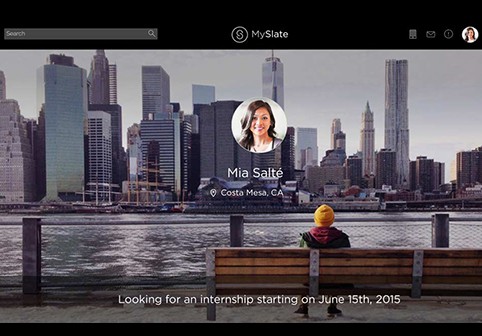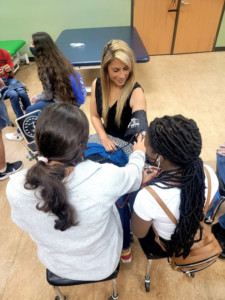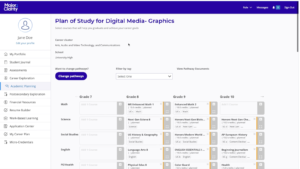Dating For A Job, Landing A Career

Nicolay Lameijer
It all began with a simple concept: employed by the local community, students could pick up time-sensitive tasks or small gigs, such as moving boxes or fixing a computer, to earn their beer money for the weekend.
However, I soon realized the gratification for quick cash was connected to a much larger, categorical issue that the millennial generation currently faces. Students today are entering a fragmented and insufficiently digitized job market. With tuition skyrocketing over the past decade and a growing mismatch in the student job market, many recent graduates find themselves facing unemployment months after receiving their diploma. Furthermore, nearly 48 percent of students with an undergraduate degree are underemployed, and that number jumps to 59 percent for graduate students. I stood by and witnessed many of my fellow peers graduate and immediately be forced to move back in with their parents because they didn’t have a sustainable job.
These statistics shocked me and I immediately became anxious to find out why this is happening. I soon discovered that one of the biggest problems is that it is very difficult for a student to know where they stand in the job market. They are lost. It’s hard and discouraging to try to find a place where your limited skills and experiences are seen as valuable assets. This lack of direction causes students to mindlessly send out non-targeted resumes and then hope that some employer out there will respond with an interview opportunity.
On the other side, employers are receiving thousands of resumes from unqualified candidates and they are forced to use applicant-tracking systems (ATS) to filter the resumes. The filtering process of an ATS identifies keywords on resumes that the employer is looking for, and ignores all of the resumes that don’t contain these certain keywords. So in many cases, the difference between getting a job and not getting a job comes down to using the right words on the resume, not the actual skills and qualifications.
This outdated method is what I have identified to be the old school recruitment model. I began brainstorming new approaches to improve the job application process, and I was inspired by one particular aspect of college: dating. There are quite a lot of similarities that can be drawn between the recruitment processes and dating—both sides are trying to impress each other in the hopes that they can start a formal relationship. I used the successful online dating models as the basis for designing the new school recruitment process where a match is made before even applying for jobs.
By making a match between student achievements and company requirements prior to the applications process, MySlate filters out students that are under qualified or simply uninterested in the position or the employer. The match also breaks the ice for both parties allowing for much simpler, open, and comfortable communications, where both the student and the employer are aware of the mutual interest. By doing this, we are also attacking the issue of the high turnover rate that is experienced by many employers when dealing with the millennial age group. Thus, matching allows for a stronger and longer lasting relationship.
After having done this research I couldn’t help but feel that it was my obligation to now do something about it. I couldn’t just stand by and watch knowing in the back of my mind that I have the ability and opportunity to help. After all, this is the job market that I, too, am facing after graduation. I decided I did not want to enter into this increasingly unsatisfying job hunt after my four years of university came to an end. Instead, I made it my job to find my peers jobs. So I started writing. I wrote until I couldn’t write anymore, and then I wrote some more. I asked myself every possible question I could think of and when I ran out of questions I asked the people around me to critique and question me.
It was around this time that I was first introduced to my Co-Founder and CTO who reached out to me about some matching project they were starting. I am strong believer in the flow of energy, and the more energy you put into something, the more the universe conspires around you to make it happen. After several passionate and constructive conversations we both knew that we had found the partner we were searching for. Two months after our initial meeting we came up with the name and we founded MySlate.com.
The first order of business was to get the right team of advisors and investors on board. The written research quickly transformed into a business plan and we started digging into our networks. We got in touch with several interested angels and we managed to raise $100,000 in start up capital. It seemed to me as if overnight my life had turned upside down. I went from being a regular college student to a passionate, opportunity hungry founder.
The founding has been an incredible experience. We are excited to be joining an awesome community of businesses who are also addressing the problems revolving around the student job market. We are proud to be working side by side with companies like Collegefeed who help elite students get better access to jobs, Internships.com who provide students with internship opportunities, and MyEdu who have launched an initiative to take an alternative approach to resume profiles.
The MySlate journey is only just beginning. It started with a simple idea, and transformed into a company that is changing the way we recruit. We are excited to launch this year and students and companies have the opportunity to pre-register for MySlate. Students and recent graduates need jobs, internships, events, and any other professional opportunities there are.
That is why we are giving away one interest pool free of charge to employers that pre-register. This interest pool can be used to match with students and it allows for unlimited job posting. I hereby would like to challenge employers to post as many jobs as they can and keep doing so until we fix this broken market.
This blog is part of our GenDIY series. We would love to have your voice in the GenDIY conversation. To contribute a blog, ask a question, or for more information, email Tyler with the subject “GenDIY.” For more information about the project see Tell Your Story: Do-It-Yourself Pathways From School to Career as well as other blogs:
- How I Worked to Discover My Passion and Start My Business
- Doing It Yourself: From Independent Learning Plans to Organizing Your Instructional Path
- GenDIY Profile: Career Path High School
Nicolay Lameijer is co-founder of MySlate. Follow Nicolay on Twitter with @NicolayLameijer.








0 Comments
Leave a Comment
Your email address will not be published. All fields are required.